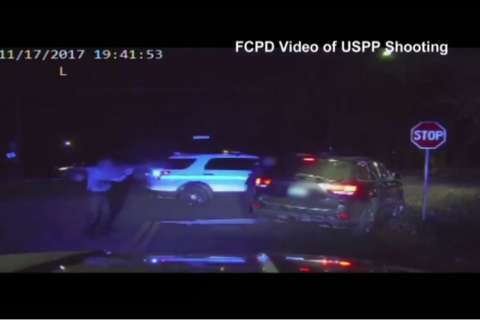Fairfax County, Virginia, police tested body-worn cameras in 2018, and several county leaders are expressing support for plans to bring them back permanently.
It’s estimated that a program to outfit some 1,200 officers with cameras would cost almost $30 million over the first five years.
The price tag includes hiring 34 additional people to help handle the video: 23 in the Commonwealth’s Attorney’s office, six in information technology, and five in the police department.
Board of Supervisors Chairman Sharon Bulova thinks the cameras are needed. “I think that we should move forward,” she said Tuesday at a meeting of the Public Safety Committee.
Lee District Supervisor Jeff McKay agreed, adding, “I don’t think this board is going to reject this. I would hope this board would accept the body-worn camera program. I think it’s important.”
Springfield District Supervisor Pat Herrity said that he would love to see police get the body-worn cameras because they help determine facts, but he is concerned about the expense.
“It’s pretty cost prohibitive at this stage, in my opinion,” Herrity said.
Also concerned about the price is Mason District Supervisor Penny Gross. “On the one hand it sounds like a really good idea, but on the other hand the cost factor is so huge; and there are so many unknowns, so I’m not quite there yet,” she said.
The goal is to come up with a plan to put before the full board in September.
A study by American University researchers determined that a body-worn camera pilot program conducted by Fairfax County police from March 3 to Sept. 1, 2018 went well.
During the test, half of the officers at the Mason, Mount Vernon and Reston police stations were randomly assigned to wear body-worn cameras, while the other half went about their jobs without the cameras. A total of 191 cameras were deployed.
Among the study’s findings:
— There was no indication that the cameras changed the way officers did their jobs, but the use of the cameras led to a slight decrease in the average number of complaints by members of the community against officers who wore them compared to those who did not.
— 603 people who had interacted with a police officer (some wearing cameras, others not) during the testing phase took part in a phone interview afterward. Asked to agree or disagree with a series of statements, 83% agreed that they were satisfied with how they were treated by the officer they encountered. Older people were more likely to agree than younger, and the percentages of Caucasian and Asian people who agreed were substantially higher than the percentages of African Americans, Hispanics and Native Americans.
— 92% of those surveyed agreed that body-worn cameras should be worn by all officers in the department. Whether the officer they encountered had a body-worn camera or not didn’t seem to have any meaningful impact on their answer.







